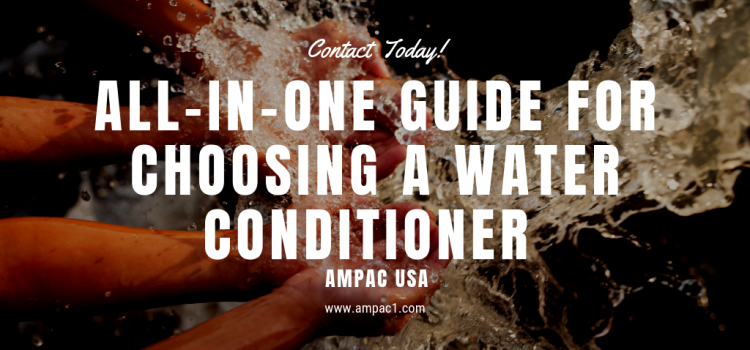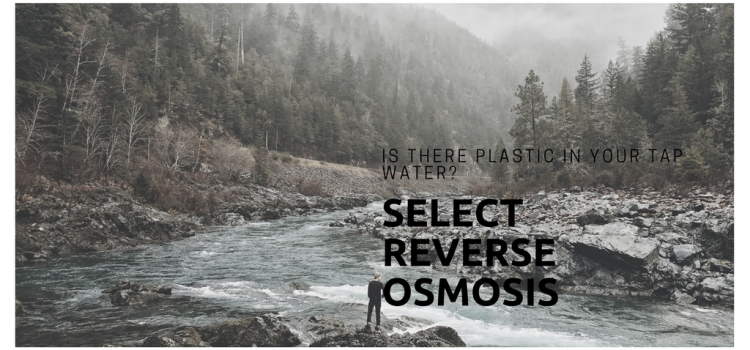Water Conditioners are an aid to make a treatment system, plumbing, appliance last long by preventing hard particles to harm the equipment. Careful purchase of a conditioner is as important as buying the RO system. It is responsible for ensuring the smooth process of reverse osmosis by nullifying the hard effects of substances on the membrane thereby improving lifespan. This article by AMPAC USA covers all the aspects of conditioners. From the selection of an appropriate softener to purchasing one, this is an all-in-one guide for water conditioners.
Description:
Water conditioners, also known as softeners solve hard water problems. Water containing a large amount of hard mineral content does not necessarily pose a health risk but causes problems to the plumbing. Equipment like heaters, filters, taps, pipes get corroded, scaled or deposits. According to the U.S. Geological Survey, around 85% of American homes face problems with hard water.
What Problems Does A Conditioner Solve?
Softeners are specially designed for hard minerals. This comes from aquifers, underground or wells and has dissolved minerals like calcium, magnesium carbonate, and manganese. These minerals are what give the solution a level of hardness which is measured by grains of minerals per gallon (GPG) or parts per million. Ideally, any solution with 1 GPG is considered hard but realistically, 3.5 GPG is soft and 10.5 GPG is very hard.
The problems associated with hard water have more to do with expense than health. Many of these problems surface only when a malfunction occurs in one of the machines. When hard water is heated, the minerals recrystallize and began depositing on the internal surfaces of equipment. It clogs the plumbing and reduces the flow. These scale and lime deposits take a major toll on heating appliances like heaters, RO Filters, coffeemakers, dishwashers, and washing machines. This makes the machines more likely to fail. A study commissioned by the Water Quality Research Council at New Mexico State University found that when plagued with hard water, the performance of heaters is lowered by 22-30%.
Hard water also prevents lather formation in soaps and shampoos forcing you to use more soap and use more water to rinse it off. This implies they reduce the cleaning capabilities of soaps. It forms deposits on the utensils and scum on the bathroom tiles which is difficult to remove. Although its effects on health are not as bad as the machinery, people who drink hard water are prone to rashes and skin infections. Use of a conditioner reduces the dissolved minerals to avoid the above-mentioned problems.
Types Of Softeners
Different types of softeners are used to overcome problems related to dissolved minerals. These softeners force chemical reaction thereby eliminating the hard minerals, making the solution soft and non-harmful to the system especially the RO membrane. Below are some types of conditioners that are well suited for different purposes.
- Salt-based Ion-exchange
This uses the ion exchange method to eliminate hard minerals by substituting calcium, magnesium, and iron for sodium ions. It cycles the water through two tanks, one that consists of special resin beads and the other contains brine. - Salt-free
This is for people who are concerned with increased salt intake. It uses the same method as the salt-based ion exchanger, although it uses potassium chloride salt substitute in place of sodium. One other property of this conditioner is that it is a de-scaler. It does not eliminate hard minerals but prevents the deposits or scaling on internal plumbing surfaces. - Dual Tank
this type of softener is apt for large families or businesses where a break in supply can be a problem. Most softener tanks regenerate the conditioned water in the night causing a small downtime. To avoid this and ensure a constant supply, two tanks with two resin beds are used for uninterrupted supply of filtered and softened water.
Tips To Buy Water Softeners
Before someone purchases a softener, it is essential for them to understand whether the house needs a conditioner. Some tips can come in handy to make sure the right decision is made.
- Find out the type of softener and system that is needed
- Ensure high-quality components and a metered valve for higher efficiency
- Confirm you buy the right size system for the house
- Test the water before purchase. The system may require more than just a conditioner
- Compare the price with value and quality
A very important part of these pointers is to know whether the price matches the value of the product and if the product is a perfect fit. Like any other equipment or purchase, water conditioner purchase has to be an informed purchase or else it can either be an unnecessary expense or health hazard.
Associated Costs
Another important aspect of having a conditioner system is the question of buying or renting. These systems cost several thousands of dollars mostly between $700 – $2500 or more. Additionally, maintenance costs go up to $150 or more annually. Even after the softening process, the amount of sodium in your water should be low. If one is concerned with the amount of sodium, they can instead consider choosing a potassium chloride softener option although it is more expensive. Companies also give these systems for rent at the rates of $15-$100 per month based on several factors.
Water Conditioner Certification
Before the purchase of a conditioner system, ensure the certifications that it comes with. NSF International is an independent organization that tests and certifies water treatment products. Water Quality Association, on the other hand, is the industry’s trade organization which also certifies equipment with their WQA Gold seal. These certifications do not guarantee performance but validate the manufacturer’s claims and ensure the system is up to the industry’s standards.
About the Author:
AMPAC USA is a water treatment systems manufacturer for 30 + years and is leaders in RO systems. The company offers WQA certified products including water conditioners and treatment chemicals. AMPAC USA has expertise in RO Treatment equipment for every industry and purpose.









